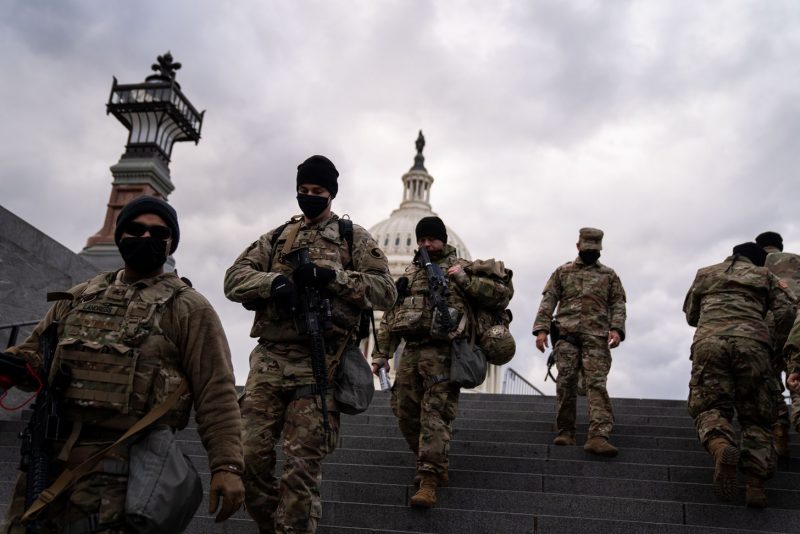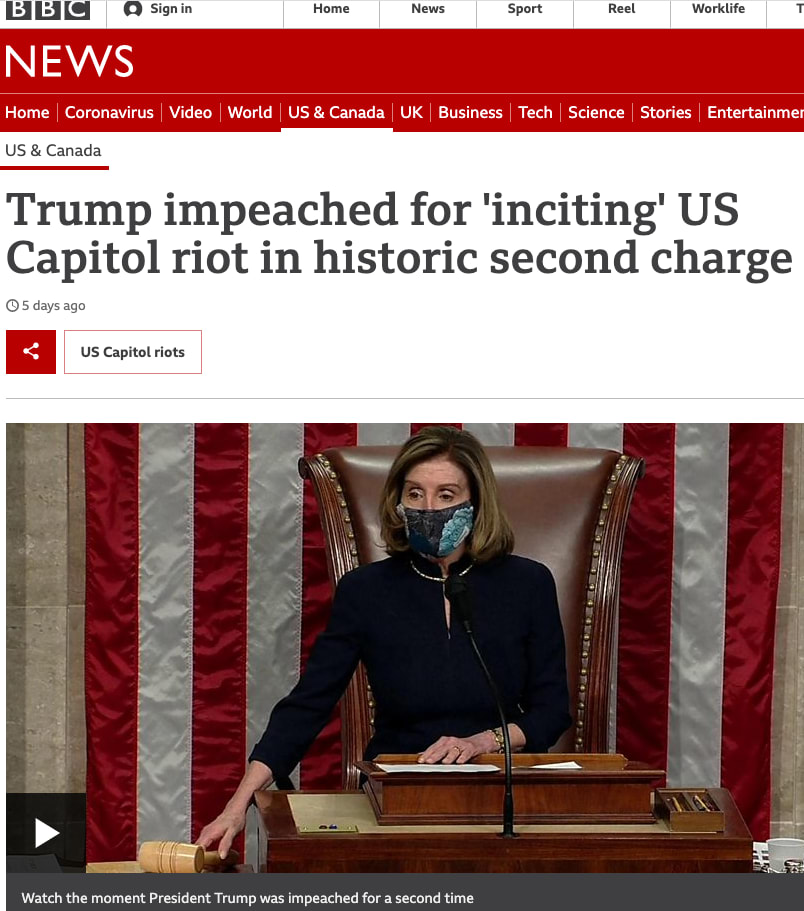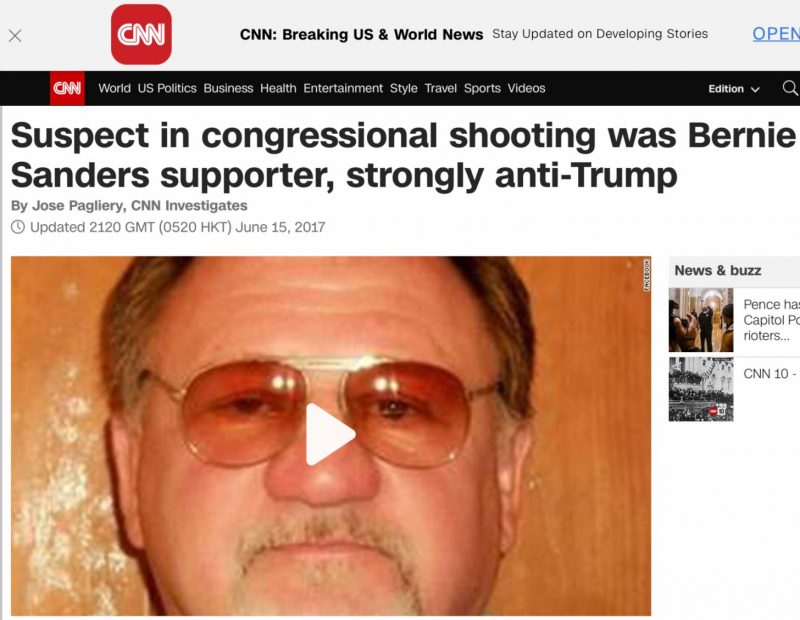No speculation is needed. Those who wield power are demanding it. The only question is how much opposition they will encounter.

The last two weeks have ushered in a wave of new domestic police powers and rhetoric in the name of fighting “terrorism” that are carbon copies of many of the worst excesses of the first War on Terror that began nearly twenty years ago.
This trend shows no sign of receding as we move farther from the January 6 Capitol riot. The opposite is true: it is intensifying.
We have witnessed an orgy of censorship from Silicon Valley monopolies with calls for far more aggressive speech policing, a visibly militarized Washington, D.C. featuring a non-ironically named “Green Zone,” vows from the incoming president and his key allies for a new anti-domestic terrorism bill, and frequent accusations of “sedition,” “treason,” and “terrorism” against members of Congress and citizens.
This is all driven by a radical expansion of the meaning of “incitement to violence.” It is accompanied by viral-on-social-media pleas that one work with the FBI to turn in one’s fellow citizens (See Something, Say Something!) and demands for a new system of domestic surveillance.
Underlying all of this are immediate insinuations that anyone questioning any of this must, by virtue of these doubts, harbor sympathy for the Terrorists and their neo-Nazi, white supremacist ideology.
Liberals have spent so many years now in a tight alliance with neocons and the CIA that they are making the 2002 version of John Ashcroft look like the President of the (old-school) ACLU.

The U.S. Department of Homeland Security website, touting a trademarked phrase licensed to it in 2010 by the City of New York, urging citizens to report “suspicious activity” to the FBI and other security state agencies
The more honest proponents of this new domestic War on Terror are explicitly admitting that they want to model it on the first one.
A New York Times reporter noted on Monday that a “former intelligence official on PBS NewsHour” said “that the US should think about a ‘9/11 Commission’ for domestic extremism and consider applying some of the lessons from the fight against Al Qaeda here at home.”
More amazingly, Gen. Stanley McChrystal — for years head of Joint Special Operations Command in Iraq and the commander of the war in Afghanistan — explicitly compared that war to this new one, speaking to Yahoo News:
“I did see a similar dynamic in the evolution of al-Qaida in Iraq, where a whole generation of angry Arab youth with very poor prospects followed a powerful leader who promised to take them back in time to a better place, and he led them to embrace an ideology that justified their violence. This is now happening in America….I think we’re much further along in this radicalization process, and facing a much deeper problem as a country, than most Americans realize.”
Anyone who, despite all this, still harbors lingering doubts that the Capitol riot is and will be the neoliberal 9/11, and that a new War on Terror is being implemented in its name, need only watch the two short video clips below, which will clear their doubts for good.
It is like being catapulted by an unholy time machine back to Paul Wolfowitz’s 2002 messaging lab.
The first video, flagged by Tom Elliott, is from Monday morning’s Morning Joe program on MSNBC (the show that arguably did more to help Donald Trump become the GOP nominee than any other).
It features Jeremy Bash — one of the seemingly countless employees of TV news networks who previously worked in Obama’s CIA and Pentagon — demanding that, in response to the Capitol riot, “we reset our entire intelligence approach,” including “look[ing] at greater surveillance of them,” adding: “the FBI is going to have to run confidential sources.”
See if you detect any differences between what CIA operatives and neocons were saying in 2002 when demanding the Patriot Act and greater FBI and NSA surveillance and what this CIA-official-turned-NBC-News-analyst is saying here:
The second video features the amazing declaration from former Facebook security official Alex Stamos, talking to the very concerned CNN host Brian Stelter, about the need for social media companies to use the same tactics against U.S. citizens that they used to remove ISIS from the internet — “in collaboration with law enforcement” — and that those tactics should be directly aimed at what he calls extremist “conservative influencers.”
“Press freedoms are being abused by these actors,” the former Facebook executive proclaimed. Stamos noted how generous he and his comrades have been up until now: “We have given a lot of leeway — both in the traditional media and in social media — to people with a very broad range of views.”
But no more.
Now is the time to “get us all back in the same consensual reality.”
In a moment of unintended candor, Stamos noted the real problem: “there are people on YouTube, for example, that have a larger audience than people on daytime CNN” — and it’s time for CNN and other mainstream outlets to seize the monopoly on information dissemination to which they are divinely entitled by taking away the platforms of those whom people actually want to watch and listen to:
(If still not convinced, and if you can endure it, you can also watch MSNBC’s Joe Scarborough and Mika Brzezinski literally screaming that one needed remedy to the Capitol riot is that the Biden administration must “shutdown” Facebook. Shutdown Facebook).
Calls for a War on Terror sequel — a domestic version complete with surveillance and censorship — are not confined to ratings-deprived cable hosts and ghouls from the security state.
The Wall Street Journal reports that “Mr. Biden has said he plans to make a priority of passing a law against domestic terrorism, and he has been urged to create a White House post overseeing the fight against ideologically inspired violent extremists and increasing funding to combat them.”
Meanwhile, Congressman Adam Schiff (D-CA) — not just one of the most dishonest members of Congress but also one of the most militaristic and authoritarian — has had a bill proposed since 2019 to simply amend the existing foreign anti-terrorism bill to allow the U.S. Government to invoke exactly the same powers at home against “domestic terrorists.”
Why would such new terrorism laws be needed in a country that already imprisons more of its citizens than any other country in the world as the result of a very aggressive set of criminal laws?
What acts should be criminalized by new “domestic terrorism” laws that are not already deemed criminal?
They never say, almost certainly because — just as was true of the first set of new War on Terror laws — their real aim is to criminalize that which should not be criminalized: speech, association, protests, opposition to the new ruling coalition.
US Speaker of the House Nancy Pelosi (D-CA) flanked by Rep. Adam Schiff (D-CA) (R) and Rep. Jerry Nadler (D-NY), speaks at a press conference on Capitol Hill (Photo by OLIVIER DOULIERY/AFP via Getty Images)
The answer to this question — what needs to be criminalized that is not already a crime? — scarcely seems to matter.
Media and political elites have placed as many Americans as they can — and it is a lot — into full-blown fear and panic mode, and when that happens, people are willing to acquiesce to anything claimed necessary to stop that threat, as the first War on Terror, still going strong twenty years later, decisively proved.
=====
An entire book could — and probably should — be written on why all of this is so concerning. For the moment, two points are vital to emphasize.
First, much of the alarmism and fear-mongering is being driven by a deliberate distortion of what it means for speech to “incite violence.”
The bastardizing of this phrase was the basis for President Trump’s rushed impeachment last week.
It is also what is driving calls for dozens of members of Congress to be expelled and even prosecuted on “sedition” charges for having objected to the Electoral College certification, and is also at the heart of the spate of censorship actions already undertaken and further repressive measures being urged.

This phrase — “inciting violence” — was also what drove many of the worst War on Terror abuses.
I spent years reporting on how numerous young American Muslims were prosecuted under new, draconian anti-terrorism laws for uploading anti-U.S.-foreign-policy YouTube videos or giving rousing anti-American speeches deemed to “incite violence” and thus provide “material support” to terrorist groups — the exact theory which Rep.
Schiff is seeking to import into the new domestic War on Terror.
It is vital to ask what it means for speech to constitute “incitement to violence” to the point that it can be banned or criminalized.
The expression of any political viewpoint, especially one passionately expressed, has the potential to “incite” someone else to get so riled up that they engage in violence.
If you rail against the threats to free speech posed by Silicon Valley monopolies, someone hearing you may get so filled with rage that they decide to bomb an Amazon warehouse or a Facebook office.
If you write a blistering screed accusing pro-life activists of endangering the lives of women by forcing them back into unsafe back-alley abortions, or if you argue that abortion is murder, you may very well inspire someone to engage in violence against a pro-life group or an abortion clinic.
If you start a protest movement to object to the injustice of Wall Street bailouts — whether you call it “Occupy Wall Street” or the Tea Party — you may cause someone to go hunt down Goldman Sachs or Citibank executives who they believe are destroying the economic future of millions of people.
If you claim that George W. Bush stole the 2000 and/or 2004 elections — as many Democrats, including members of Congress, did — you may inspire civic unrest or violence against Bush and his supporters.
The same is true if you claim the 2016 or 2020 elections were fraudulent or illegitimate.
If you rage against the racist brutality of the police, people may go burn down buildings in protest — or murder randomly selected police officers whom they have become convinced are agents of a racist genocidal state.
The Bernie Sanders campaign volunteer and hard-core Democratic partisan, James Hodgkinson, who went to a softball field in June, 2017 to murder Republican Congress members — and almost succeeded in fatally shooting Rep. Steve Scalise (R-LA) — had spent months listening to radical Sanders supporters and participating in Facebook groups with names like “Terminate the Republican Party” and “Trump is a Traitor.”
Hodgkinson had heard over and over that Republicans were not merely misguided but were “traitors” and grave threats to the Republic.
As CNN reported, “his favorite television shows were listed as ‘Real Time with Bill Maher;’ ‘The Rachel Maddow Show;’ ‘Democracy Now!’ and other left-leaning programs.”
All of the political rhetoric to which he was exposed — from the pro-Sanders Facebook groups, MSNBC and left-leaning shows — undoubtedly played a major role in triggering his violent assault and decision to murder pro-Trump Republican Congress members.

Despite the potential of all of those views to motivate others to commit violence in their name — potential that has sometimes been realized — none of the people expressing those views, no matter how passionately, can be validly characterized as “inciting violence” either legally or ethically.
That is because all of that speech is protected, legitimate speech. None of it advocates violence. None of it urges others to commit violence in its name.
The fact that it may “inspire” or “motivate” some mentally unwell person or a genuine fanatic to commit violence does not make the person espousing those views and engaging in that non-violent speech guilty of “inciting violence” in any meaningful sense.
To illustrate this point, I have often cited the crucial and brilliantly reasoned Supreme Court free speech ruling in Claiborne v. NAACP.
In the 1960s and 1970s, the State of Mississippi tried to hold local NAACP leaders liable on the ground that their fiery speeches urging a boycott of white-owned stores “incited” their followers to burn down stores and violently attack patrons who did not honor the protest.
The state’s argument was that the NAACP leaders knew that they were metaphorically pouring gasoline on a fire with their inflammatory rhetoric to rile up and angry crowds.
But the Supreme Court rejected that argument, explaining that free speech will die if people are held responsible not for their own violent acts but for those committed by others who heard them speak and were motivated to commit crimes in the name of that cause (emphasis added):
Civil liability may not be imposed merely because an individual belonged to a group, some members of which committed acts of violence. . . .
[A]ny such theory fails for the simple reason that there is no evidence — apart from the speeches themselves — that [the NAACP leader sued by the State] authorized, ratified, or directly threatened acts of violence. . . . . To impose liability without a finding that the NAACP authorized — either actually or apparently — or ratified unlawful conduct would impermissibly burden the rights of political association that are protected by the First Amendment. . . .
While the State legitimately may impose damages for the consequences of violent conduct, it may not award compensation for the consequences of nonviolent, protected activity. Only those losses proximately caused by unlawful conduct may be recovered.
The First Amendment similarly restricts the ability of the State to impose liability on an individual solely because of his association with another.
The Claiborne court relied upon the iconic First Amendment ruling in Brandenburg v. Ohio, which overturned the criminal conviction of a KKK leader who had publicly advocated the possibility of violence against politicians.
Even explicitly advocating the need or justifiability of violence for political ends is protected speech, ruled the court.
They carved out a very narrow exception: “where such advocacy is directed to inciting or producing imminent lawless action and is likely to incite or produce such action” — meaning someone is explicitly urging an already assembled mob to specific violence with the expectation that they will do so more or less immediately (such as standing outside someone’s home and telling the gathered mob: it’s time to burn it down).
It goes without saying that First Amendment jurisprudence on “incitement” governs what a state can do when punishing or restricting speech, not what a Congress can do in impeaching a president or expelling its own members, and certainly not social media companies seeking to ban people from their platforms.
But that does not make these principles of how to understand “incitement to violence” irrelevant when applied to other contexts.
Indeed, the central reasoning of these cases is vital to preserve everywhere: that if speech is classified as “incitement to violence” despite not explicitly advocating violence, it will sweep up any political speech which those wielding this term wish it to encompass.
No political speech will be safe from this term when interpreted and applied so broadly and carelessly.
And that is directly relevant to the second point. Continuing to process Washington debates of this sort primarily through the prism of “Democrat v. Republican” or even “left v. right” is a sure ticket to the destruction of core rights.
There are times when powers of repression and censorship are aimed more at the left and times when they are aimed more at the right, but it is neither inherently a left-wing nor a right-wing tactic.
It is a ruling class tactic, and it will be deployed against anyone perceived to be a dissident to ruling class interests and orthodoxies no matter where on the ideological spectrum they reside.
The last several months of politician-and-journalist-demanded Silicon Valley censorship has targeted the right, but prior to that and simultaneously it has often targeted those perceived as on the left.
The government has frequently declared right-wing domestic groups “terrorists,” while in the 1960s and 1970s it was left-wing groups devoted to anti-war activism which bore that designation.
In 2011, British police designated the London version of Occupy Wall Street a “terrorist” group. In the 1980s, the African National Congress was so designated.
“Terrorism” is an amorphous term that was created, and will always be used, to outlaw formidable dissent no matter its source or ideology.
If you identify as a conservative and continue to believe that your prime enemies are ordinary leftists, or you identify as a leftist and believe your prime enemies are Republican citizens, you will fall perfectly into the trap set for you.
Namely, you will ignore your real enemies, the ones who actually wield power at your expense: ruling class elites, who really do not care about “right v. left” and most definitely do not care about “Republican v. Democrat” — as evidenced by the fact that they fund both parties — but instead care only about one thing: stability, or preservation of the prevailing neoliberal order.
Unlike so many ordinary citizens addicted to trivial partisan warfare, these ruling class elites know who their real enemies are: anyone who steps outside the limits and rules of the game they have crafted and who seeks to disrupt the system that preserves their prerogatives and status.
The one who put this best was probably Barack Obama when he was president, when he observed — correctly — that the perceived warfare between establishment Democratic and Republican elites was mostly theater, and on the question of what they actually believe, they’re both “fighting inside the 40 yard line” together:
A standard Goldman Sachs banker or Silicon Valley executive has far more in common, and is far more comfortable, with Chuck Schumer, Nancy Pelosi, Mitch McConnell, Mitt Romney and Paul Ryan than they do with the ordinary American citizen.
Except when it means a mildly disruptive presence — like Trump — they barely care whether Democrats or Republicans rule various organs of government, or whether people who call themselves “liberals” or “conservatives” ascend to power.
Some left-wing members of Congress, including Rep. Alexandria Ocasio-Cortez (D-NY) and Ilhan Omar (D-MN) have said they oppose a new domestic terrorism law, but Democrats will have no trouble forming a majority by partnering with their neocon GOP allies like Liz Cheney to get it done, as they did earlier this year to stop the withdrawal of troops from Afghanistan and Germany.
Neoliberalism and imperialism do not care about the pseudo-fights between the two parties or the cable TV bickering of the day.
They do not like the far left or the far right.
They do not like extremism of any kind.
They do not support Communism and they do not support neo-Nazism or some fascist revolution.
They care only about one thing: disempowering and crushing anyone who dissents from and threatens their hegemony.
They care about stopping dissidents.
All the weapons they build and institutions they assemble — the FBI, the DOJ, the CIA, the NSA, oligarchical power — exist for that sole and exclusive purpose, to fortify their power by rewarding those who accede to their pieties and crushing those who do not.
No matter your views on the threat posed by international Islamic radicalism, huge excesses were committed in the name of stopping it — or, more accurately, the fears it generated were exploited to empower and entrench existing financial and political elites.
The Authorization to Use Military Force — responsible for twenty-years-and-counting of war — was approved by the House three days after the 9/11 attack with just one dissenting vote.
The Patriot Act — which radically expanded government surveillance powers — was enacted a mere six weeks after that attack, based on the promise that it would be temporary and “sunset” in four years.
Like the wars spawned by 9/11, it is still in full force, virtually never debated any longer and predictably expanded far beyond how it was originally depicted.
The first War on Terror ended up being wielded primarily on foreign soil but it has increasingly been imported onto domestic soil against Americans.
This New War on Terror — one that is domestic in name from the start and carries the explicit purpose of fighting “extremists” and “domestic terrorists” among American citizens on U.S. soil — presents the whole slew of historically familiar dangers when governments, exploiting media-generated fear and dangers, arm themselves with the power to control information, debate, opinion, activism and protests.

That a new War on Terror is coming is not a question of speculation and it is not in doubt.
Those who now wield power are saying it explicitly.
The only thing that is in doubt is how much opposition they will encounter from those who value basic civic rights more than the fears of one another being deliberately cultivated within us.
***
Glenn Greenwald is a journalist, constitutional lawyer, and author of four New York Times bestselling books on politics and law. His most recent book, “No Place to Hide,” is about the U.S. surveillance state and his experiences reporting on the Snowden documents around the world. Prior to co-founding The Intercept, Greenwald’s column was featured in The Guardian and Salon.
Glenn is one of the three co-founding editors of The Intercept. He left The Intercept in October 2020.
Published by https://greenwald.substack.com/ Suscribe to his newsletter
Republished by The 21st Century
The views expressed in this article are solely those of the author and do not necessarily reflect the opinions of 21cir.
